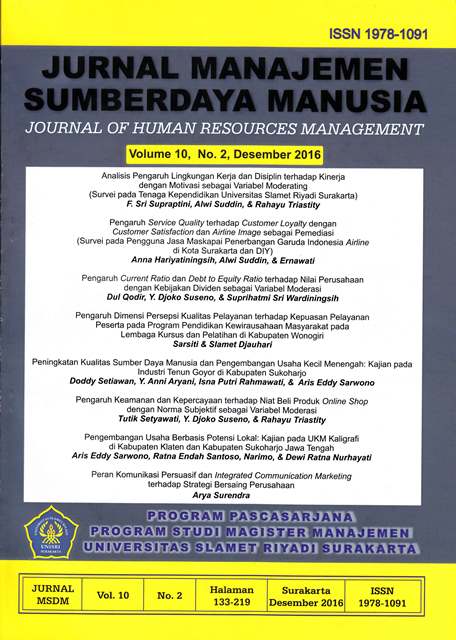ANALISIS PENGARUH LINGKUNGAN KERJA DAN DISIPLIN TERHADAP KINERJA DENGAN MOTIVASI SEBAGAI VARIABEL MODERATING (Survei pada Tenaga Kependidikan Universitas Slamet Riyadi Surakarta)
Abstract
Survey research conducted at the University of Slamet Riyadi Surakarta
(UNISRI), aims to identify and analyze the significance of the influence of the
working environment, discipline, motivation on the performance of education
personnel University of Slamet Riyadi Surakarta (UNISRI), with motivation
as a moderating variable. The samples using proportional random sampling,
the number of samples are 82 educators. Methods of observation and data
collection using questionnaires that have been tested for validity and
reliability. Types of qualitative and quantitative data. Mechanical analysis
using classical assumption test, multiple linear regression, t-test, F,
coefficient determination and test the absolute difference. The results
showed that the working environment and work motivation had no significant
effect on the performance of education personnel UNISRI, work discipline
significant effect on the performance of educators UNISRI. Motivation
moderating influence on the performance of the work environment UNISRI
education personnel. Motivation strengthen the influence of the working
environment. Motivation does not moderate influence on the performance of
labor discipline UNISRI education personnel, motivation actually weaken the
influence of labor discipline on the performance of education personnel
UNISRI.
Keywords: work environment, discipline, motivation and performance
Downloads
Published
How to Cite
Issue
Section
License
Authors who publish this journal agree to the following terms:
- Authors retain copyright and grant the journal right of first publication with the work simultaneously licensed under a Creative Commons Attribution License that allows others to share the work with an acknowledgement of the work's authorship and initial publication in this journal.
- Authors can separately make additional contractual arrangements for non-exclusive distribution published by the journal (e.g., publish it in a book), with an acknowledgement of its initial publication in this journal.
- Authors are allowed and encouraged to send their work via online (e.g., in the institutional repositories or their website) after published by the journal.













 Â
 
